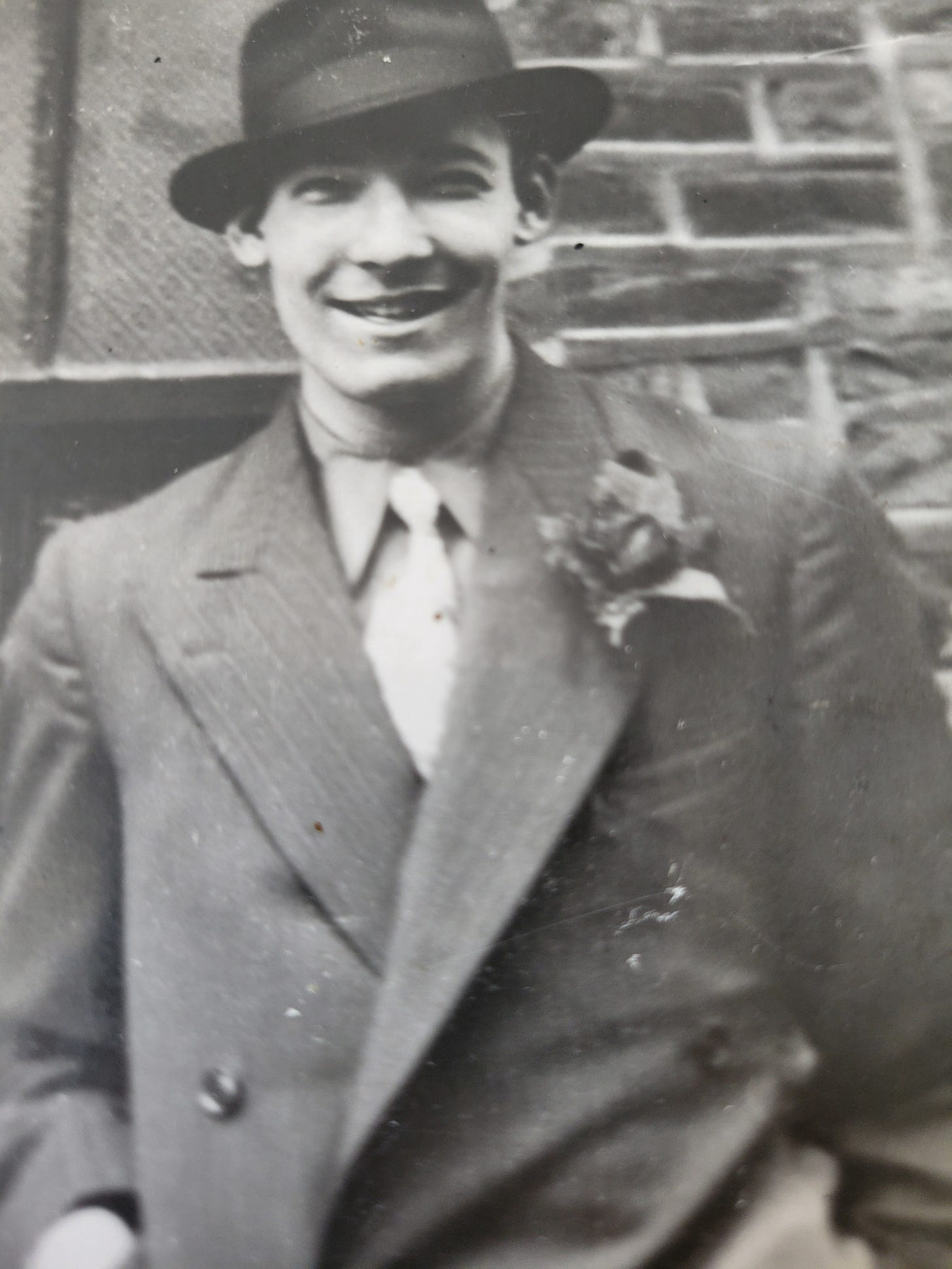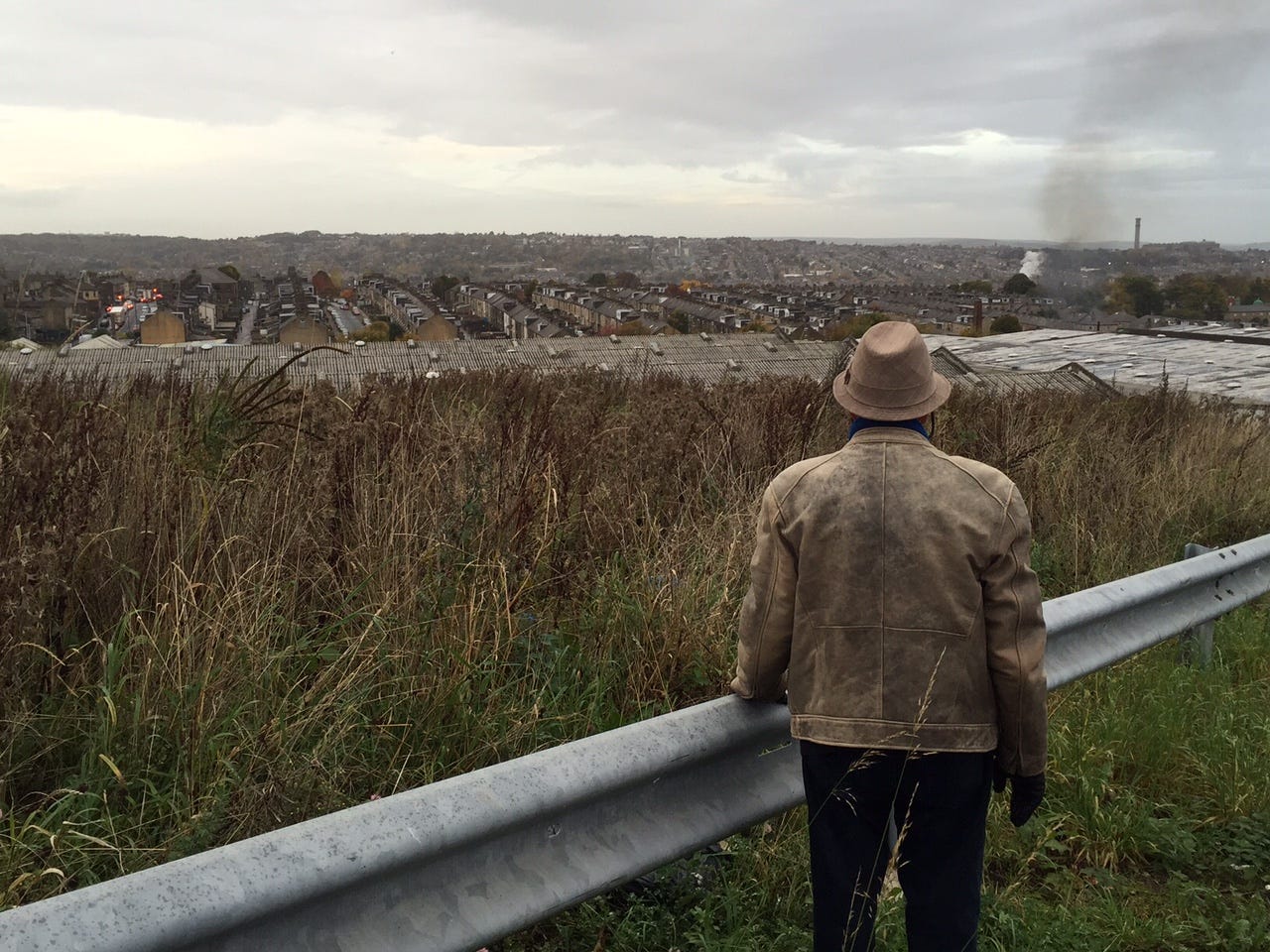A new chapter selection from harry Leslie Smith’s The Green & Pleasant Land below. It tells a true story about the lives of working class people who lived during a time of political and economic extremities. From their sufferings these unemployed miners, mill workers, along with the rest of ordinary Britain made a better world for themselves and others by constructing a Welfare State, where all could share in a nation’s prosperity.
The Harry’s Last Stand project which I worked on with my Dad for the last 10 years of his life was an attempt to use his life story as a template to effect change. His unpublished history- The Green & Pleasant Land is a part of that project. I have been working on it, refining it and editing it to meet my dad’s wishes. It should be ready for a publisher in May.
Your support in keeping my dad’s legacy going and me alive is greatly appreciated. I depend on your subscriptions to keep the lights on and me housed. So if you can please subscribe and if you can’t it is all good because we are fellow travellers in penury. But always remember to share these posts far and wide. Below is another chapter selection from the Green & Pleasant Land.
From 1937 until 1941, when I volunteered for the RAF, my workday mornings always began at 5:30 AM. At that hour, my mother woke our house like a sergeant major. She banged on pots and screamed. "Wakey, Wakey."
Downstairs in the kitchen, I drank strong tea with milk and sugar because in full-time work- my wages allowed me that simple luxury. To appease my appetite, I smoked half a cigarette for my breakfast. I saved the other half for my walk to Grosvenor's main shop- which was located near Halifax's town centre.
When I arrived at work, my task was to load a barrow with giant blocks of cheese cut from their wheels. Along with the cheese, I loaded the barrow with butter, bacon and shoulders of smoked pork, which needed to be delivered to Grosvenor's other shop at the Arcade on Commercial Street.
It was a beast of burden work, but I did it with youthful enthusiasm. On those mornings, I wielded my freight like an acrobat from road to pavement and back to road. I dodged with alacrity the shop girls, clerks and those with expensive suits who crowded my route.
When I arrived at the arcade, I unloaded my wares. Afterwards, I worked behind the meat counter and took customers' orders. For six days a week, I worked 12 to 13 hours per day and believed myself lucky because I remember the long, lean years when my dad was unemployed.
At fourteen years old, whether my life was long or short; a destiny spread out before me as it had spread out before to all those in my family, living and dead. I was to be a pack animal for capitalism. In 1937, it horrified me and depressed me that my class predefined my future.
It was hard to express openly my opposition to this because, to the people I knew, it was their expected lot, something to be endured. To want more than adequate wages to live a substandard life was considered getting above one's station. Britain's working classes were militant for the essentials. But they were cowed; when it came to demanding life with as many diversions as the middle classes.
As best as I could, I tried not to think about what awaited me in my 20s or 30s if the politics of Britain didn't change. Instead that year I developed friendships with three young men from backgrounds similar to mine. During the times, when I was working or reading books at the library I spent it with them because they were easy-going and like me wanted to forget the hunger from childhood caused by the Great Depression.
.
Eric Whitely was a year older than me and an apprentice engineer. Eric was all-modern, quick-witted, and boastful. But he was also a Labour Party member and believed in worker solidarity. He grew a wispy-haired moustache that- with his thin terrier face made him look like someone on the take. It was make-believe but he liked to cultivate that impression so that others would see him as more worldly than Halifax. Eric introduced me to Roy Broadbent, who lived with his mother and elderly aunt.
Broadbent worked at Macintoshes making sweets and did so until the 1980s- never once being promoted to a different job position in his forty-eight years of employment there.
Roy- like me- lacked a father in his life but his dad left his life through death rather than cold-blooded reasons of survival. His mother coddled him and by all accounts he had a very easy Great Depression. But Roy made up for that because of the action he saw as a member of the Cold Stream Guards during the Second World War.
Eric’s father was very much alive and was a lamplighter. In the tea time light of Halifax, on my way home from Grosvenor's, I'd see Eric's father igniting the gas lamps with a large staff. If he spotted me, he'd bid me good evening and tell me to stay out of trouble.
On Saturday nights, Roy dressed as he imagined, from the cinema, an American gangster would be decked out. Roy would wear a fedora hat and sported wing-tipped shoes. Eric called him “boss” in mock deference. Roy's personality was the furthest thing from being a boss. The moment when Roy opened his mouth or extended his hand, it was obvious; his character was soft and kind. He was incapable of malice except for the sin of vanity.
The final element in my trinity of mates was Doug Butterworth. He lived near King Cross with his mother, brother, and sister. I loved Doug the most because of his family. His mother always let me kip at their house if I had rowed with my mother. It was the first time in my life that I felt accepted as an equal, and these friends never judged my dodgy background. So, I kept quiet about my more socialist beliefs because it felt safer to have friends than strong opinions that I didn't have the means to act upon.
After work on weekends, my friends and I would meet up in a pub and nurse a half pint until it was time to go to the cinema or the dance hall. At the pub despite the Spanish War being on the all the news reels in 1937 and something that interested me, my friends and I never discuss it. Instead we talked about football or the girls we fancied.
After the pub if there was no movie to our liking,, we went to a dance hall where jazz musicians played swing music from America. I didn't know how to dance there had been no time or money to learn. So when I was at the dance hall while Roy and Eric found girls to dance with, I I circled the dance floor's perimeter. If I found a stray, partner-less girl, I'd chat them up and inquire if after the dance; they wanted company on their way home.
If I was lucky, a girl accepted my advances. While walking her home if in agreement, we stopped at People's Park. There we'd kiss or or grope each other in furtive and futile attempts at sex. There was more failure than success as I was petrified about getting my partner pregnant. I had witnessed, too many times, love wrung out of adults from the cruelties of trying to keep themselves and their kids fed during times of economic catastrophe.
Thanks for reading and supporting my Substack. Your support keeps me housed and also allows me to preserve the legacy of Harry Leslie Smith. A yearly subscriptions will cover much of next month’s rent. Your subscriptions are so important to my personal survival because like so many others who struggle to keep afloat, my survival is a precarious daily undertaking. The fight to keep going was made worse- thanks to getting cancer along with lung disease and other co- morbidities which makes life more difficult to combat in these cost of living crisis times. So if you can join with a paid subscription which is just 3.50 a month or a yearly subscription or a gift subscription. I promise the content is good, relevant and thoughtful. But if you can’t it all good too because I appreciate we are in the same boat. Take Care, John



Sounds very like where Britain is headed again. I think the Tory politicians would see it as a blueprint for the near future
Thanks again J.M. for sharing your father's life. The chapters are always too short. I think about my own father. He would have been 18 and living the American version of that hell on this side of the pond in '37. He spoke little about it. I know it shaped him into a lifetime frugal Democrat. "Use it up, wear it out, make it do, or do without." I remember him saying. Thanks to his and my mother's experience of life in those times (She was abandoned by alcoholic parents and lived many years in an orphanage.) I lived a good young life. My parents didn't want me to live like they were forced to. Oh I wasn't born with a silver spoon up my ass, but I had good shoes, clean clothes, a hair cut and I was never hungry. Never missed a day in school, unless it snowed, and graduated college, back when an average kid could afford to do so. With a bit of help from mom and dad. That's all going to hell now. Every institution and enterprise is price gouging the shit out of us here. Inflation is rising because companies are combining and those that aren't are sharing pricing information to raise costs. Especially in the oil and gas fracking industry, the grocery sector and housing. All have lost lawsuits and still have lawsuits pending. We can sue their pants off but they won't stop!
I could go on and on. I can't wait until May. I've got to read that book. Hurry up 😄